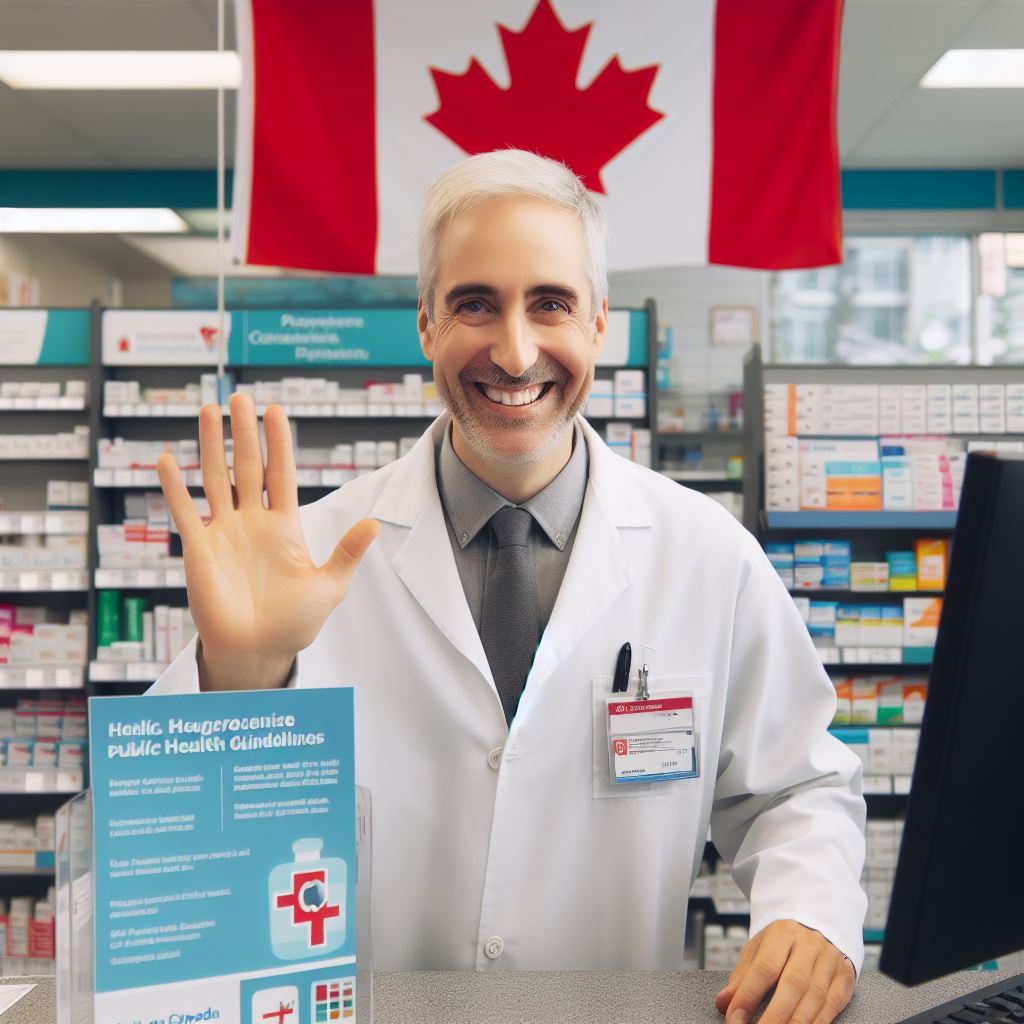Introduction
Welcome to “Life of a Canadian Doctor,” where we offer you a glimpse into the daily experiences and challenges faced by Canadian doctors!
In this blog post, we will delve into the unique aspects of their lives and provide insights into the intricacies of their profession.
Day in the Life of a Canadian Doctor: Real Stories
Understanding the daily life of a doctor is important as it sheds light on the profession and helps us appreciate their hard work and dedication.
Canadian doctors have a wide range of experiences, from working in hospitals to clinics and from rural areas to urban centers.
Each day presents unique scenarios and demands specific skills.
By exploring their real stories, we can gain insight into the diverse challenges they encounter.
The Importance of understanding the daily life of a doctor
From early mornings to late nights, doctors dedicate themselves to caring for patients and improving their health.
They must balance clinical work, administrative tasks, and continuous learning.
The importance of understanding their routine lies in recognizing the sacrifices they make for the well-being of others.
Variety of experiences doctors may have
Moreover, their daily interactions with patients and colleagues shape their perspectives and influence their decision-making process.
By delving into their experiences, we gain a deeper appreciation for the immense responsibility they carry and the impact they have on individuals and communities.
The next section will delve into the specifics of a typical day in the life of a Canadian doctor, showcasing various branches of medicine and the unique challenges they bring.
Their stories will provide us with insights into their work, shedding light on the triumphs, struggles, and dedication that make up their lives.
Join us on this journey as we uncover the realities of being a Canadian doctor and gain a deeper appreciation for their tireless efforts to improve the health and well-being of our society.
Morning Routine
- Start of the day for a Canadian doctor
- Wake-up time and preparation for the day
- Typical breakfast and self-care activities
- Commute to the hospital or clinic
Read: How to Become a Doctor in Canada: A Step-by-Step Guide
Patient Consultations
Arrival at the hospital or clinic
Upon arrival, Canadian doctors prepare themselves for a day filled with patient consultations.
Overview of patient consultations
Patient consultations involve assessing, diagnosing, and treating patients’ medical conditions.
Variety of patients and conditions
Canadian doctors encounter a diverse range of patients with different medical conditions, from minor ailments to life-threatening illnesses.
The Importance of effective communication and empathy
Doctors understand the significance of effectively communicating with patients to establish trust and provide the best possible care.
They also empathize with patients’ emotional and physical struggles.
Challenges faced during consultations
Doctors face numerous challenges during patient consultations, including time constraints, complex cases, and difficult conversations.
Read: The Evolution of Medical Practice in Canada
Medical Procedures and Rounds
Involvement in medical procedures and surgeries
Doctors actively participate in various medical procedures and surgeries.
Preparation and implementation of treatments
They prepare and implement treatments that are tailored to each patient’s specific needs.
Unlock Your Career Potential
Visualize a clear path to success with our tailored Career Consulting service. Personalized insights in just 1-3 days.
Get StartedHow doctors collaborate with other healthcare professionals
Collaboration with other healthcare professionals is crucial for doctors to provide comprehensive care.
Attend rounds and discuss patient progress with colleagues
Doctors attend rounds, where they discuss patient progress and exchange information with colleagues.
Administrative Tasks
As a doctor, there are various administrative tasks that need to be taken care of on a daily basis.
These tasks are essential for the smooth functioning of a medical practice and ensuring that patients receive the best possible care.
1. Documentation and Medical Record-Keeping
- Doctors are responsible for maintaining detailed and accurate medical records for each patient.
- This involves documenting the patient’s medical history, symptoms, diagnoses, treatments, and follow-up plans.
- Thorough documentation is crucial for effective communication among healthcare professionals and ensuring continuity of care.
- Doctors must also adhere to legal and ethical standards when handling and storing patient records.
2. Time Spent on Phone Calls and Managing Paperwork
- Aside from patient consultations, doctors spend a significant amount of time on phone calls and paperwork.
- This includes communicating with other healthcare providers, scheduling appointments, and coordinating patient care.
- Doctors also handle insurance forms, medical billing, and other administrative paperwork.
3. Importance of Staying Updated on Medical Advancements
- Medical knowledge and practices are constantly evolving, making it essential for doctors to stay updated.
- Doctors must allocate time for attending conferences, seminars, and continuing medical education programs.
- Keeping up with the latest research and advancements helps doctors provide the most current and effective treatments to their patients.
- Being informed about new medications, treatment guidelines, and technologies enhances the quality of patient care.
Overall, the administrative aspect of a doctor’s job is crucial for ensuring quality patient care and the smooth functioning of a medical practice.
Documentation and medical record-keeping help healthcare providers provide the best care possible, while proper management of paperwork and phone calls ensures efficient communication and coordination.
Additionally, staying updated on medical advancements allows doctors to continuously enhance their knowledge and deliver the most effective treatments to their patients.
While administrative tasks may take away time from direct patient care, they are an integral part of a doctor’s responsibilities and contribute to overall healthcare quality.
Read: Challenges Faced by Canadian Doctors Today
Uncover the Details: Healthcare Admin: Challenges & Rewards
Uncover the Details: How to Become a Healthcare Administrator
Continuing Education is Vital for Doctors
Importance of continuing education for doctors
Continuing education is an essential aspect of a doctor’s professional growth and competence.
It allows them to stay updated with the latest medical advancements, techniques, and knowledge required to provide the best quality care to their patients.
Engagement in Research and Clinical Trials
Doctors also actively engage in research and clinical trials to contribute to the advancement of medical science and improve patient outcomes.
Through research, they seek answers to medical questions and develop innovative treatments and therapies.
- Contributing to medical advancements: By actively participating in research and clinical trials, doctors play a crucial role in advancing medical science and developing new treatments for various conditions.
- Improving patient outcomes: Research and clinical trials allow doctors to discover innovative therapies and interventions that can significantly improve patient outcomes and overall healthcare.
Attending Medical Conferences and Workshops
Attending medical conferences and workshops is another crucial aspect of a doctor’s continuing education.
These events provide opportunities to learn from experts in various medical fields, gain new perspectives, and network with colleagues.
- Learning from experts: Medical conferences and workshops provide valuable opportunities for doctors to learn from experts in their respective fields, gaining insights and knowledge that can enhance their practice.
- Networking and collaboration: These events also facilitate networking and collaboration among doctors, leading to the exchange of ideas, sharing of experiences, and potential collaborations for research or clinical projects.
Balancing Patient Care with Professional Development
As doctors, balancing patient care with professional development is of utmost importance.
While patient care is their primary responsibility, continuing education ensures they stay updated and proficient in their respective fields.
- Time management: Doctors need to effectively manage their time to ensure they provide adequate patient care while also dedicating time for continuing education activities.
- Prioritization: Balancing patient care and professional development requires doctors to prioritize their commitments and allocate time for both with careful consideration.
- Multidisciplinary approach: Engaging in research, attending conferences, and collaborating with colleagues from various medical specialties can help doctors develop a holistic and multidisciplinary approach to patient care.
Why is Continuing Education Important?
- Staying updated with evolving medical knowledge: Medical advancements occur at a rapid pace, and continuing education enables doctors to stay on top of the latest research, treatments, and technologies.
- Enhancing patient care: By regularly updating their knowledge and skills, doctors can provide the best possible care to their patients, resulting in improved outcomes and quality of life.
- Promoting evidence-based practice: Continuing education equips doctors with the latest evidence-based guidelines and clinical practices, ensuring that their treatments are based on the best available evidence.
- Addressing knowledge gaps: Through continuing education, doctors can identify and address any knowledge gaps they may have, ensuring they are well-informed in all aspects of their field.
Overall, continuing education is vital for doctors as it allows them to stay updated with evolving medical knowledge, enhances patient care, and contributes to medical advancements.
Engaging in research, attending medical conferences, and balancing patient care with professional development are all essential components of a Canadian doctor’s journey.
By maintaining a commitment to lifelong learning, doctors can provide the best possible care to their patients and contribute to the advancement of medicine.
Read: Top Canadian Medical Schools: An In-Depth Review

Gain More Insights: Paramedic vs EMT: Understanding the Differences
Unexpected Situations and Emergencies
Being a doctor is often associated with an unpredictable nature of the job.
Every day brings new challenges and unexpected situations that require immediate attention.
In this section, we will explore how doctors deal with emergencies, urgent cases, and handle the high-stress moments that come their way.
The Unpredictable Nature of a Doctor’s Job
- Doctors never know what awaits them when they start their day; each patient brings a unique set of symptoms.
- Their expertise and adaptability are put to the test as they navigate through various medical conditions.
- The unpredictable nature of the job requires doctors to remain alert and prepared for anything that comes their way.
Dealing with Emergencies and Urgent Cases
- Doctors are often the first responders in emergency situations, where every second counts.
- They must efficiently assess the situation, make quick decisions, and provide immediate medical intervention.
- Emergency rooms become a hub of activity, with doctors working collaboratively to stabilize critical patients.
- Time management becomes crucial as doctors prioritize cases based on the severity of the condition.
Handling Unexpected Situations and High-Stress Moments
- Unexpected situations, such as complications during surgeries, demand doctors to remain calm and think on their feet.
- They rely on their experience, knowledge, and effective communication to address the crisis effectively.
- High-stress moments can arise during critical diagnoses or when dealing with emotionally charged situations.
- Doctors must manage their emotions while providing support to patients and their families.
The Impact of Such Events on a Doctor’s Daily Life
- Dealing with emergencies and unexpected situations can take a toll on a doctor’s personal and professional life.
- The long hours, constant pressure, and emotional strain can lead to burnout and fatigue.
- It becomes crucial for doctors to prioritize self-care and seek support from peers and mentors.
- Although challenging, these experiences also serve as opportunities for growth and learning.
Furthermore, being a doctor means facing the unpredictable nature of the job daily.
From emergencies to unexpected situations, doctors must handle high-stress moments while maintaining composure and providing optimal care.
Such events have a significant impact on their daily lives, requiring them to find a balance between work and personal well-being.
Despite the challenges, doctors persevere and continue to make a difference in the lives of their patients.
Conclusion
Different aspects of a Canadian doctor’s day
In fact, a day in the life of a Canadian doctor is filled with various aspects.
Challenges, rewards, and dedication required
They face challenges, but also experience rewarding moments that make their job worthwhile.
Their dedication to improving the health and well-being of others should be appreciated.
Encouragement to appreciate the work of doctors
It is crucial to acknowledge the importance of supporting healthcare professionals, as they play a significant role in society.
Without them, the healthcare system would not function efficiently. Their hard work and commitment should be recognized and valued.
As readers, let us take a moment to appreciate the work of doctors and all healthcare professionals who tirelessly serve the community.
Their selflessness and expertise contribute to the overall well-being of society.
In review, being a Canadian doctor requires immense dedication, empathy, and knowledge.
They juggle multiple responsibilities and face numerous challenges.
However, the rewards of positively impacting patients’ lives make it a fulfilling career choice.
The Importance of Supporting Healthcare Professionals
Let us show our support and gratitude to these healthcare heroes by respecting their work and advocating for better healthcare resources.
It is essential to understand the complexities of their job and the importance of investing in healthcare infrastructure.
Finally, the life of a Canadian doctor is demanding and rewarding.
Their crucial role in providing healthcare services cannot be overstated.
Let us value their hard work, dedication, and sacrifices. Support, appreciation, and empathy go a long way in ensuring a strong healthcare system for all.




